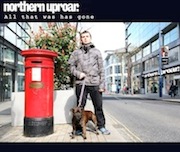One might have reasonably expected Northern Uproar to hail from some grisly and iconic mill town wedged into a Pennine Valley. Perhaps they would be photographed in combat jackets, beneath some politicised graffito.
As such, it always seemed mildly incongruous to discover that they hailed from the deadening sprawl of Heald Green, a swathe of 70s estates lying close to Manchester’s Ringway Airport. Despite this prevailing geographic dullness, or perhaps because of it, Northern Uproar hurtled into public awareness back in the heart of the guitar-laden era of the mid-90s – I refuse to use the phrase Britpop – as four teenage lads armed with a bucket of genuinely insightful songs and a reputation for ferocious live shows. This, I can vouch for, having caught them on a steamy night at Manchester’s Roadhouse in 1994. It was difficult to sense that any kind of failure might be looming… and, in many ways, the dream unfurled into a frenetic cycle that would see the band signing to Heavenly, scoring a Top Of The Pops appearance, music press covers and a sprightly debut album produced by James Dean Bradfield and Manics producer Dave Eringa. As Northern Uproar’s single, ‘From A Window’ shunted its way to number 17, the future appeared in a haze of blinding brilliance.
Life, as it tends to, kind of got in the way and while four albums and – mostly – continuing critical acclaim has seen a continuum of that initial dream, few would suggest that Northern Uproar fully realised their potential.
So here we are, 20 years on and with two original band members – Paul Kelly and Keith Chadwick – lost to the duties of fatherhood, we find a line up who have been together for six years and boasting an album, this album, that clearly surpasses the flawed excellence of previous outings.
And remarkable it is, too. I dislike the notion that it recalls the ‘wild days of Britpop’ as I spent most of the mid-90s recoiled in a state of open embarrassment as the outbreak of clipped guttural Manc spread across the region. It might be noted that Northern Uproar’s fantastic state of youth slowly became the trigger for their own demise, so lost, as they were, in bombastic precocity. Only now, as they edge through their mid-30s, are the pieces beginning to make perfect sense.
Taking up a Dylanesque stance, their manager insisted that I should “play it fucking loud” which initially led me to think that the re-emergence of the band might compare with latter-day Discharge, or something. Thankfully, it doesn’t. There are melodies and block chords inherent here that hold powerful echoes of The Hollies and The Troggs rather than Oasis.
The musicality has sufficiently broadened and guitars lines entwine to striking effect… and throughout the album. Fact is, three plays in and I cannot find filler. No song here trails in the shadows; no song appears to lack the exuberance that kicks in with the immediacy of opener, ‘There’s A Place’. I feel particularly drawn to the delicate summertime whimsy, ‘Riding on the Waves’, which would make a fitting anthem to a sunny week in Torquay complete with the dreamscape of a holiday romance.
One couldn’t imagine such a song falling from the edges of the original band. This contrasts neatly with the two previous songs, ‘Sometimes’ and ‘Load It Up’, which offer much in the way of bluff and bluster. Equally, ‘Never Wanted To Say’ regains the momentum and shifts heartily into a melodic surge worthy of a young Pete Shelley. Lovely stuff. A song that casts long echoes through the hours that follow a couple of plays. Refreshing? You would have to swim the North Sea while sucking an Uncle Joe’s Mintball to recreate such delicious chills. The title track, as it suggests, is a rather more reflective affair more akin to a band with a 20 year history.
Must be honest, I have no idea where Northern Uproar stand in this world of angular hair, clipped beards, of template times and the deadening sight of mass festival acceptance. This certainly bucks that trend. Eleven songs sit here, all beautifully crafted, for Northern Uproar have evolved into unlikely artisans.
It is an album spiced by a sense of holiday… a British holiday perhaps, locked in the youthful thrill of 1965? Somehow, given the current climate, this seems thrillingly relevant.


